ABC airs "Soul of a Nation," and Evanston reparations leaders respond to criticism.
- Nina Kavin

- Mar 3, 2021
- 9 min read
Updated: Mar 4, 2021
Last night, March 2, ABC aired the first episode of Soul of a Nation, a six-part series and the first broadcast network newsmagazine that aims to put Black life in America front and center. Evanston's reparations initiative and Evanston residents were featured in the 10-minute segment.
Before the show aired, Lisa Laude of Lift Your Life Radio hosted a show featuring Evanston leaders and residents who have been involved in the reparations initiative from the start, as well as national leaders from N'COBRA and NAARC who are pushing for local and federal reparations, Nkechi Taifa and Kamm Howard.
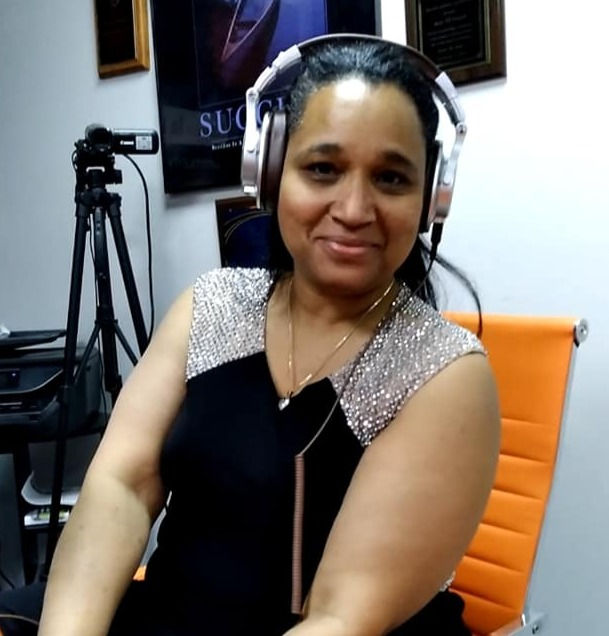
"These are fighters in the work for Reparations," Laude said introducing the show and participants. "They've done the research and stayed the course, and they know what's going on. They have the information and they want to be sure that they're sharing it with our community."
Local folks were:
Ald. Robin Rue Simmons who introduced and shepherded the reparations resolution through City Council;
Dino Robinson of Shorefront Legacy Center who provided historical data to state the case for reparations and sits of the Evanston Reparations Stakeholder Authority;
Pastor Michael Nabors, president of Evanston/North Shore Branch NAACP and senior pastor of Second Baptist Evanston, who sits on the Evanston Reparations Stakeholder Authority; and
Jared Davis, member of a legacy Evanston family to whom reparations are due, and who appears in the segment with 98-year-old Benjamin Gaines, Sr., and Benjamin Gaines, Jr. his grand-uncle and uncle. Gaines Sr. moved to Evanston in 1959.
The discussion focused on the status of Evanston's reparations
and responded to criticism by some residents -- organized as "Evanston Rejects Racist Reparations" -- that the initiative isn't headed in the right direction and who want to delay a City Council vote on the initiative, expected to happen this coming Monday, March 8, which focuses on home ownership, mortgage assistance and home improvement funds.
Watch ABC's segment below (the first few minutes are a little noisy, but that subsides).
Watch the pre-show conversation here, and read a summary of the discussion below.
Lisa Laude opened the show with a question to Nkechi Taifa, an attorney, author, scholar and activist who was an inaugural commissioner on the National African American Reparations Commission (NAARC) and a founding member of National Coalition Of Blacks for Reparations in America (N'COBRA).
"I'm really excited that so many people are getting excited about reparations, but the work started a long time ago. How do you feel about how we are progressing as a local community in Evanston when it comes to reparations?" Laude asked.
"Evanston is a pioneer ... a model a blueprint for some of the actions that the rest of the country could be and should be taking," Taifa replied.
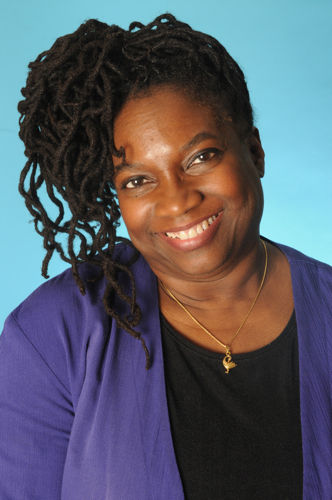
"We came to Evanston, we toured the historic areas with Dino Robinson. We saw the voluminous research that had been done. And I must say, I consider it a kind of poetic justice that Evanston decided to use what will be very lucrative revenue from the legal cannabis industry to fund reparations.
This [initiative] is built on sound historical research and study in terms of the starting off point-- redlining, housing, and the like. But that's just one small part of reparations, not the end. The harm was so very multifaceted that remedy must be multifaceted as well. So this is one piece of the pie."
So it's a process, Laude added. "As you said, there are different ways that reparations will be acquired. It's not gonna happen all at once."
Housing is "just one piece of the pie." -- Nketchi Taifa, N'COBRA
Housing, said Taifa, is just one area. "There's issues with education, mass incarceration, there's issues with other aspects of the wealth gap. But strategically, I really applaud Evanston for looking at one issue and going deep."
Asked by Laude how he sees the progress of Evanston's work, and whether the City is on the right track, Kamm Howard, a 16-year member of N’COBRA and its National Male Co-Chair, said:

"NCOBRA's totally excited about local reparations actions, particularly in Evanston because it's so close to delivering the first actual local reparative initiative in the country that was targeted for specific acts of Jim Crow segregation and redlining in particular.
We think that what Evanston is doing centered around housing as a first initiative of many is really good because it has a very measurable impact on the ability of a family to increase their wealth by this infusion of downpayment assistance.
"On a local level, you're not gonna be made whole in its entirety." -- Kamm Howard, N'COBRA
Reparations is about repair and making people whole. Getting people to a place where that healing can begin. On a local level, you're not gonna be made whole in its entirety. It's not gonna happen by one initiative. It's not gonna happen with 10 initiatives. It's going to take time for us to really repair ourselves from the centuries of harms we've accumulated.
But what we can do on the local level is to be laser-like and focused on one or two areas at a particular time, and then move on to another one or two areas and then move on to another one to areas. You're not going to do everything in the first step. These are incremental steps to get us to the where healing begins."
Jared Davis agreed.
"I'm glad that the [ABC] production emphasizes that this was not supposed to be the end-all, be-all or the silver bullet, but the introduction of it. So we're happy that the ball is rolling, and that this is being talked about and that the door is open," he said.
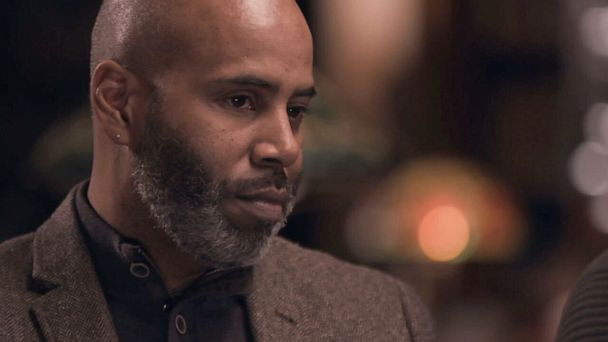
"We're trying to get the right thing done in the right manner for the right reasons. Our parents, our uncles aunts grandparents have been fighting for the same type of rights for generations before us. And so for us to be able to carry that on is a badge of honor. And then, as we all know, in our own town to even see some of our own with opposition. It is very discouraging."
"How do we get the community engaged to help it along
and understand the limitations as well?"-- Dino Robinson, Shorefront Legacy Center
This takes time, said Dino Robinson. "There are just so many things to do. We started with $0. Ald. Simmons saw an opportunity--where recreational cannabis tax money that would have gone to the City's general fund--she was able to earmark money, significant enough to try something out, to see how this works. What are the pitfalls? What do we need to improve on? And how do we get the community engaged to help it along and and understand the limitations as well?"
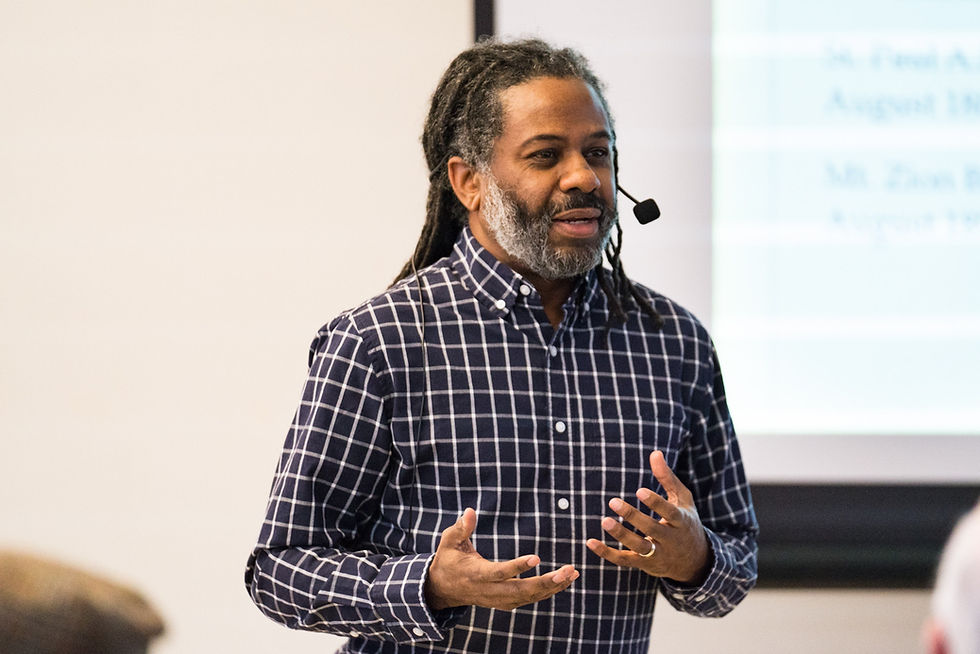
Robinson said he appreciates the conversations happening in the community, but he, said, "I want it to be as constructive as possible and forward moving. I think the phrase 'solution-based ideas' is a phenomenal path forward; not just come to the table with criticism. This whole step to start a program in something that has some benefit to residents, a life-altering opportunity-- that wasn't available two years ago. Here it is today. Now we can think bigger, and plan bigger."
Kamm Howard agreed that Evanston is headed in the right direction, but offered some advice.
"What I would say to any city that's doing local reparations is this: I've been in the reparations movement for quite a while. I've studied other movements and I've been in other movements. And what I've learned over the years is that failure in movements, sometimes come from internal strife and division. And so what they did in the reparations movement about 15 years ago, they came up with principles in this movement to keep it from imploding internally.
Those two major principles are the principles of 'operational unity,' meaning we don't have to agree on everything reparations, but we have to agree that reparations is due to us and we got to collectively struggle to make sure that happens. We don't have to be totally agreeable on everything. But we agree on the basics.
"We're not gonna win when we have all these disagreements publicly.
We have to have a reparations united front in order to win." -- Kamm Howard
The second principle is a 'reparations united front.' That means that publicly we only got to express what we agree upon, and then privately we can go and battle amongst ourselves. And, you know, we can fight it out.
So I would say to all of us Chicago, Evanston, Asheville, you have to engage in principle struggle. We're not going to agree on everything and we don't have to agree on everything to win. But we're not gonna win and we have all these disagreements publicly. We have to have a reparations united front in order to win.
History, Howard said, has taught us that, the history of struggle in this country.
"I believe undoubtedly that Evanson is moving, not only in the right direction, but in the only direction that we can move right now with regard to reparations," said Pastor Michael Nabors.
"Keep in mind that we are we are pioneering an effort as far as a local municipality is concerned, we are the first in the nation to have a resolution passed by a city council. And, of course, to the tune of $10 million. And as a result of that, we are working as we go along, but we have had an outstanding ad hoc working committee.
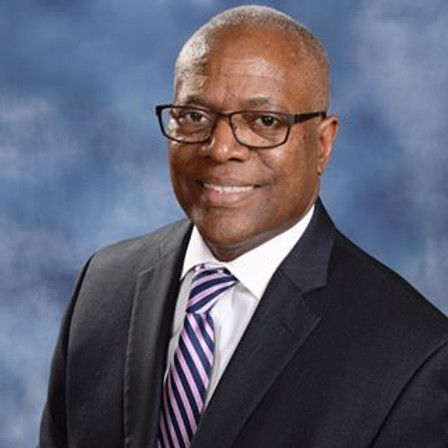
Since November of 2019, there has been a group of us that have been meeting nearly every week for over a year. We have been planning, we've been processing, we've been putting together procedures that are absolutely contingent upon the wording of the resolution. We made sure that the way the resolution was passed, and all of the work that Alderman Simmons did with community folks and their input early on--we made sure that all of that was being followed to a tee. And that's why we made the decision to go with the housing initiative first.
While everybody is not in agreement with the direction that we're going, or the tools that we're using, I believe that we can handle those disagreements in a spirit of love and mutual respect, and we can keep on going.
I don't believe that we air our differences publicly. I wasn't raised that way with my mom. We kept our family business in the family. That is the high road that we are planning to take with reparations."
"I believe that we can handle those disagreements in a spirit of love and mutual respect,
and we can keep on going." -- Pastor Michael Nabors
Ald. Rue Simmons closed out the pre-show discussion.
"I'm just so proud of the work that we have done. So proud that I serve on a city council that said yes overwhelmingly to reparations," she said. "I made a call to the community for solutions only, and those folks ready to work on solutions showed up. And here we are today, still the first city that has passed a funded reparation policy for Black residents.
I'm fully aware that this is only the first tangible step. We have a long road ahead of us. I have a lifetime of work ahead of me. We just heard from Sister Nkechi who's been working on reparations for 30 years. We took over 400 years of our time in this nation to get to this place of racial disparity, Black oppression, to the conditions that we have in this community. And it's going to take time for repair.
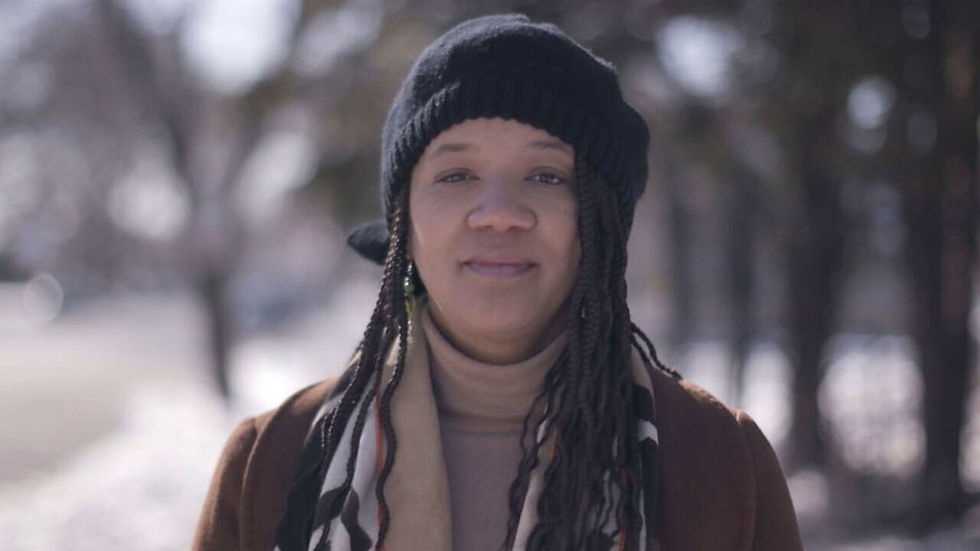
But we have to remember that our responses, our policy recommendations, have to be in line with the documented, verifiable, enforced policies specific to Evanston, and thankfully we have the service of Dino Robinson and Shorefront that documented our local Case for Reparations that is found in housing inequality and anti-Blackness and housing.
And so we're moving forward with only the first initiative-- this is a $400,000 piece of a minimum $10 million commitment we're talking about--that we have allocated for housing, and it is certainly an initiative that will instantly build wealth in the households.
Some households may qualify for two benefits receiving $50,000. I would love to have a reparative benefit towards housing for $25,000 or $50,000, and there are many residents that would love to have access to that.
One thing that we know is $25,000 invested in a home builds equity instantly, and that equity translates into wealth. You can access that equity and you can use it to start a business, you can use it to age in place if you're a senior.
One thing that I appreciate that Jared said and I completely agree with, is that we look at a way to prioritize our residents that were here during the period of injury and we're working towards that.
"We have a very engaged community, we know that the community will come out and speak,
and we will hear them." -- Ald. Robin Rue Simmons
Right now, I just wish the community would take time to celebrate that we live in a city that said yes to this, that we not only had the interest but the will and the heart to actually do it -- knowing that there will be opposition, knowing that there's no model, knowing that there's going to be attacks against it.
We said yes to doing reparations and we're doing the work. And we're very close to delivering the first benefit to an eligible resident.
We will be bringing this to the City Council on March 22 for its next action, so that we can get into the distribution stage, which would be $25,000 direct benefit, up to $50,000 direct benefit to black residents in Evanston. In the future, it could look like something different.
We have a very engaged community, we know that the community will come out and speak, and we will hear them. We're hearing all kinds of recommendations right now, but we will decide as a community on what the next step will be."






Comments